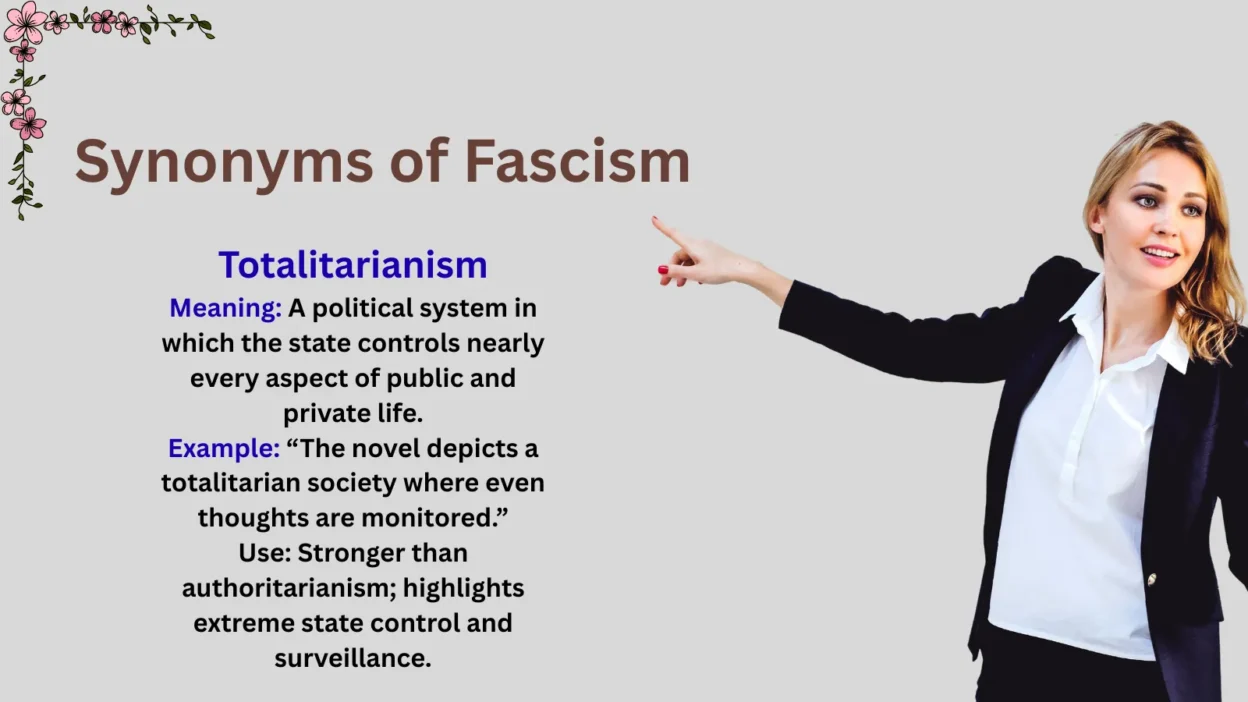Synonyms of fascism, such as authoritarianism, totalitarianism, and dictatorship, reflect the political and social extremes of control, power, and suppression. For example, “authoritarianism” focuses on strict obedience to authority, while “totalitarianism” describes an all-encompassing system that limits personal freedom. These words capture different sides of fascism—from government control to the loss of individual rights and free thought.
If you’re writing about politics, history, or social movements, choosing the right synonym for fascism helps you set the right tone and explain the level of control or oppression involved.
These synonyms of fascism not only make your writing more precise but also help you understand the deeper meanings behind political dominance and ideology. From historical analysis to modern commentary, the language of fascism reveals how power can shape and silence societies.
What Does Fascism Mean?
Fascism refers to a political system where one leader or party holds total power, often using nationalism, censorship, and force to control the people. It’s often:
- Against democracy and free speech
- Focused on loyalty to the state or leader
- Marked by strict control and propaganda
- Rooted in fear, nationalism, and authority
It’s not just a political word—it’s a warning about how unchecked power and ideology can erase freedom.
Synonyms & Related Words for Fascism (And When to Use Them)
1. Authoritarianism
Meaning: A system of government that favors strong central control and limits political freedoms.
Example: “The regime’s authoritarianism left citizens with little room to express dissent.”
Use: Neutral to formal contexts; emphasizes power structure rather than ideology.
2. Totalitarianism
Meaning: A political system in which the state controls nearly every aspect of public and private life.
Example: “The novel depicts a totalitarian society where even thoughts are monitored.”
Use: Stronger than authoritarianism; highlights extreme state control and surveillance.
3. Dictatorship
Meaning: Rule by a single leader with absolute power, often gained and maintained by force.
Example: “Under the dictatorship, opposition leaders were imprisoned without trial.”
Use: Suitable for historical and modern contexts; neutral tone for political analysis.
4. Despotism
Meaning: Exercise of absolute power, often cruel and oppressive.
Example: “The despotism of the king caused widespread fear among the people.”
Use: Emphasizes cruelty and oppression; literary or historical tone works best.
5. Tyranny
Meaning: Cruel and arbitrary rule by a government or leader.
Example: “The citizens rose up to overthrow the tyranny that had ruled for decades.”
Use: Emotional and dramatic; often used in moral or rhetorical arguments.
6. Autocracy
Meaning: Government by a single person with unrestricted power.
Example: “The autocracy left no room for public participation in decision-making.”
Use: Academic or formal tone; less emotionally charged than tyranny.
7. Nazism
Meaning: Ideology and practices associated with the Nazi Party, emphasizing racial hierarchy, nationalism, and totalitarian control.
Example: “Nazism led to one of history’s most horrific genocides.”
Use: Historical and precise; use only when discussing Nazi ideology specifically.
8. Militarism
Meaning: Emphasis on military strength and control over civil society.
Example: “The country’s militarism overshadowed democratic institutions.”
Use: Focuses on military influence rather than ideology; neutral or analytical tone.
9. Reactionism
Meaning: Extreme conservative opposition to social or political change.
Example: “Reactionism in the parliament blocked progressive reforms.”
Use: Highlights resistance to change; less commonly used but precise in historical writing.
10. Extremism
Meaning: Holding radical political or ideological views, often involving aggressive methods.
Example: “Political extremism can destabilize even well-established democracies.”
Use: General term; can be applied to any ideology perceived as extreme.
11. Oppression
Meaning: Prolonged, cruel, or unjust treatment or control over a group.
Example: “The oppression of Indigenous peoples went unchecked for decades.”
Use: Focus on impact on victims rather than political structures.
12. Repression
Meaning: The act of subduing or restricting freedoms, often violently.
Example: “The regime used censorship and police brutality to enforce repression.”
Use: Highlights methods used by authoritarian governments; suitable for analysis.
13. Dictatorial Rule
Meaning: Governance dominated by a single authority with absolute power.
Example: “Dictatorial rule stifled public debate and criticism.”
Use: Straightforward synonym; formal and descriptive.
14. One-Party State
Meaning: A political system in which only one party is allowed to govern.
Example: “The nation became a one-party state after the coup.”
Use: Focuses on political structure rather than ideology.
15. Political Oppression
Meaning: Systematic restriction of political freedoms.
Example: “Political oppression prevented citizens from voting freely.”
Use: Emphasizes suppression of civil liberties; analytical tone.
16. Junta
Meaning: Government led by a military committee, often after a coup.
Example: “The country was under a military junta for several years.”
Use: Historical or current events; highlights military control.
17. Absolutism
Meaning: A Political system where one ruler holds complete authority.
Example: “Absolutism in the monarchy limited the power of local councils.”
Use: Historical context; formal and academic.
18. Oligarchy
Meaning: Government controlled by a small, privileged group.
Example: “An oligarchy of wealthy elites dominated the nation’s policies.”
Use: Focus on the concentration of power in a few hands; neutral tone.
19. Reactionary Government
Meaning: A regime seeking to restore previous social orders and resist reform.
Example: “The reactionary government reversed years of progressive legislation.”
Use: Political and historical contexts; highlights conservative reversal.
20. Police State
Meaning: A government that maintains strict control over citizens through surveillance and policing.
Example: “Living in a police state meant constant fear of arbitrary arrest.”
Use: Evokes fear and oppression; emotional tone is strong.
21. Militant Nationalism
Meaning: Aggressive promotion of national superiority and unity, often suppressing dissent.
Example: “Militant nationalism fueled xenophobia and internal conflict.”
Use: Focus on ideology; useful when discussing nationalistic regimes.
22. Hyper-Nationalism
Meaning: Extreme pride in one’s nation combined with hostility toward outsiders.
Example: “Hyper-nationalism led the government to enact discriminatory policies.”
Use: Highlights emotional and ideological intensity; modern or historical contexts.
23. Fanaticism
Meaning: Extreme, unquestioning zeal in politics or religion.
Example: “The leader’s fanaticism inspired both fear and loyalty.”
Use: Emphasizes personal or group zeal; emotional tone.
24. Militant Authoritarianism
Meaning: Aggressive and forceful authoritarian rule.
Example: “Militant authoritarianism left no space for political compromise.”
Use: Combines force and control; suitable for analytical or journalistic writing.
25. Intolerance
Meaning: Lack of acceptance toward opposing opinions or groups.
Example: “Intolerance marked the regime’s approach to dissenting voices.”
Use: Focuses on social and cultural suppression rather than formal structures.
26. Ultra-Conservatism
Meaning: Extreme commitment to traditional values and opposition to change.
Example: “Ultra-conservatism influenced policies restricting women’s rights.”
Use: Highlights ideological rigidity; less directly linked to authoritarian control.
27. Repressive Regime
Meaning: A government that systematically restricts freedoms and rights.
Example: “The repressive regime censored the press and jailed critics.”
Use: Emphasizes impact on citizens; descriptive and analytical.
28. Party-State
Meaning: A state where a single party dominates all aspects of governance.
Example: “In the party-state, the government and ruling party were inseparable.”
Use: Focus on the political system; neutral and technical tone.
29. Authoritarian Rule
Meaning: Governance characterized by strong central control and limited freedoms.
Example: “Authoritarian rule in the country was justified as necessary for stability.”
Use: Straightforward and formal; neutral descriptor for analysis.
30. Extremist Regime
Meaning: A government pursuing radical policies, often intolerant of opposition.
Example: “The extremist regime imposed harsh laws to suppress dissent.”
Use: Emphasizes ideology and radical measures; suitable for commentary or reporting.
Choosing the Right Synonym
Selecting the most effective synonym of fascism depends on your context:
- Formal or academic writing: Authoritarianism, totalitarianism, autocracy, oligarchy, absolutism.
- Historical discussion: Nazism, despotism, absolutism, junta, one-party state.
- Emotional or rhetorical emphasis: Tyranny, oppression, police state, fanaticism, extremist regime.
- Political analysis: Reactionary government, militant nationalism, ultra-conservatism, repressive regime.
Pay attention to subtle differences: “tyranny” conveys moral condemnation, “authoritarianism” is more neutral, while “Nazism” refers to a specific ideology. The tone you want—neutral, analytical, or emotionally charged—should guide your choice.
Conclusion
Understanding the synonyms of fascism helps you describe different shades of power, control, and political oppression with precision. Whether you’re writing about history, government, or modern movements, words like authoritarianism, dictatorship, and totalitarianism reveal how absolute power shapes societies.
By choosing the right synonym, you can express the dangers of unchecked authority and the importance of protecting freedom and democracy.
These terms also highlight how language captures political realities across time. Recognizing them deepens your insight into how societies resist or fall under oppressive rule.



